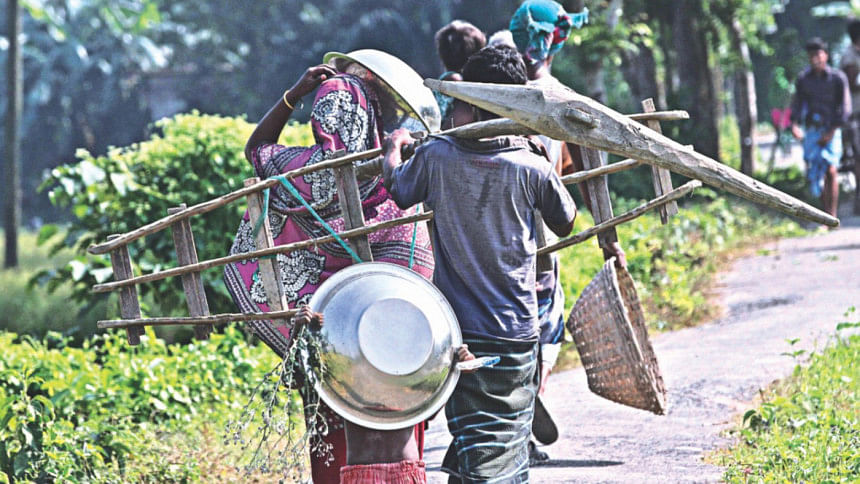Social safety net to widen

Around 16 lakh more elderly citizens, widows, and people with disabilities are likely to get government benefits from next fiscal year.
The amount of the cash allowance will be the Tk 500 per month received by current beneficiaries, said finance ministry sources, adding that the government is set to expand the social safety net coverage in the upcoming budget.
Over eight lakh of the fresh beneficiaries are elderly people, four lakh are widowed, deserted and destitute women, and three lakh are insolvent disabled people, they said.
The addition of the 16 lakh people brings the total number of beneficiaries under the three allowance programmes to 1.16 crore -- 57 lakh elderly people, 24.5 lakh widowed and destitute women, and 21 lakh insolvent disabled people.
The government will also increase allowances for freedom fighters to Tk 20,000 in the next fiscal year from the current Tk 12,000. Some 1.92 lakh freedom fighters will get the benefits, the finance ministry sources said.
For the cash allowances to these vulnerable groups under its nine core safety net schemes, the government may propose an increase of Tk 4,400 crore in the allocation for the allowance programmes in the budget to be placed on June 3, the finance ministry officials said.
In the outgoing budget, the allocation was Tk 10,212 crore.
According to finance ministry officials, all the elderly people, widowed and destitute women, and people with disabilities of 150 poverty-prone upazilas are to be brought under the allowance schemes in the next fiscal year. The allowance programmes currently cover 112 such upazilas.
"Our target next year is 100 percent [coverage] of such beneficiaries of 150 upazilas. The government wants to cover all the upazilas of the country in the next three years," said a top official of the finance ministry, wishing not to be named.
The government introduced the old-age allowance in 1997-98 fiscal year to ensure social security of the elderly. With four lakh beneficiaries who got Tk 100 each, the expenditure in Bangladesh's old-age allowance scheme is one of the lowest in the world.
The government launched the widow's allowance the following year with the same goal. The monthly allowances under the scheme was initially Tk 100. However, the amount of both schemes was raised to Tk 500 three years ago, which is still insignificant considering inflation and price hike of essentials.
Social safety net programmes, according to various studies, have been effective in reducing poverty in the country. Despite progress in lifting people out of poverty over the past decades, the government implements a number of safety net schemes to support the poor and vulnerable.
Apart from these allowances and the one for freedom fighters, the government is also running food assistance programmes such as Vulnerable Group Development (VGD), Vulnerable Group Feeding (VGF), Test Relief (TR) and Food for Work.
Every year, the size of the safety net increases. The need for higher allocation for the social safety net programmes in the budget was badly felt during the ongoing Covid-19 pandemic.
To meet its growing expenditure for social protection and safety net programmes, finance ministry officials said the government may earmark Tk 103,600 crore for the next fiscal year 2021-22. In that case, it would be an 8.4 percent rise from the revised allocation of Tk 95,574 crore in the current fiscal year.
The allocation for the safety net programmes is about 2.97 percent of the country's gross domestic product (GDP), they said.
However, a large share -- or Tk 23,000 crore -- of the social protection allocation was set aside for the payment of pensions for retired government employees and their families and to pay interests against savings certificates.
The budget for the core safety net programmes -- like food assistance programmes, including VGD, VGF, and TR, could go up to Tk 19,000 crore in the new fiscal year, up from Tk 17,981 crore of the outgoing year, the officials said.
The next fiscal's allocation for stipends may stand at Tk 5,000 crore, up by Tk 10 crore from the current fiscal.
The allotment for other social protection programmes may go up to Tk 65,000 crore, up 41.47 percent year on year.
Despite such an increase in allocation, there are concerns raised by experts and various studies that the real poor and vulnerable usually do not benefit from a large portion of social protection allocation.
In September last year, a Centre for Policy Dialogue (CPD) study found that 65 percent of the fund from the government's social safety net programmes went to the non-poor owing to nepotism, corruption and political consideration in selecting beneficiaries.
Titled "Efficiency of Delivering Social Protection Programmes in the North-West Region", the study conducted by the CPD said the safety net programmes can cover only a fraction of the total poor population as just 32.5 percent poor households received some forms of assistance.
Citing statements of a number of chairmen and members of the local government bodies, and government officials, the study said most of the targeting errors in case of maternity allowance and old-age allowance occur in the form of cards being given away on "political consideration".
Similarly, a government-commissioned research found that a bulk of the safety net benefits ended up in the non-deserving non-poor groups.
Released in June last year, the research report by Bangladesh Institute of Development Studies (BIDS) said the share of comfortable non-poor beneficiaries is about 30 percent when it comes to allowance programmes, 32 percent in food-supported programmes, 44 percent in maternity allowance in rural areas. "Even when it comes to social protection, the extreme poor group constitutes a minority," said the report.


 For all latest news, follow The Daily Star's Google News channel.
For all latest news, follow The Daily Star's Google News channel. 



Comments